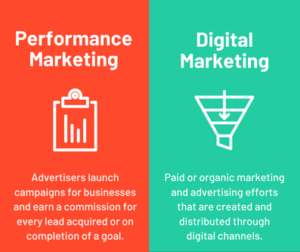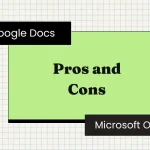What is the Difference between Digital Marketing And Performance Marketing
Digital Marketing encompasses all marketing efforts that use electronic devices or the internet, while Performance Marketing is specifically focused on campaigns where advertisers pay based on performance, such as conversions or clicks. Delve into the realm of Digital Marketing, and you’ll find a broad spectrum of strategies that leverage online…
Digital Marketing encompasses all marketing efforts that use electronic devices or the internet, while Performance Marketing is specifically focused on campaigns where advertisers pay based on performance, such as conversions or clicks. Delve into the realm of Digital Marketing, and you’ll find a broad spectrum of strategies that leverage online platforms to promote products and services, aiming to reach a vast digital audience.
Performance Marketing, a subset of this digital cosmos, concentrates on concrete results and accountability, with advertisers investing in campaigns with quantifiable outcomes that directly impact their bottom line. Understanding the nuances between these two can empower businesses to allocate their marketing budgets more effectively, ensuring that each campaign is tailored to meet specific objectives and generate measurable returns on investment.
With the digital landscape constantly evolving, mastering both areas is vital for a robust online presence.
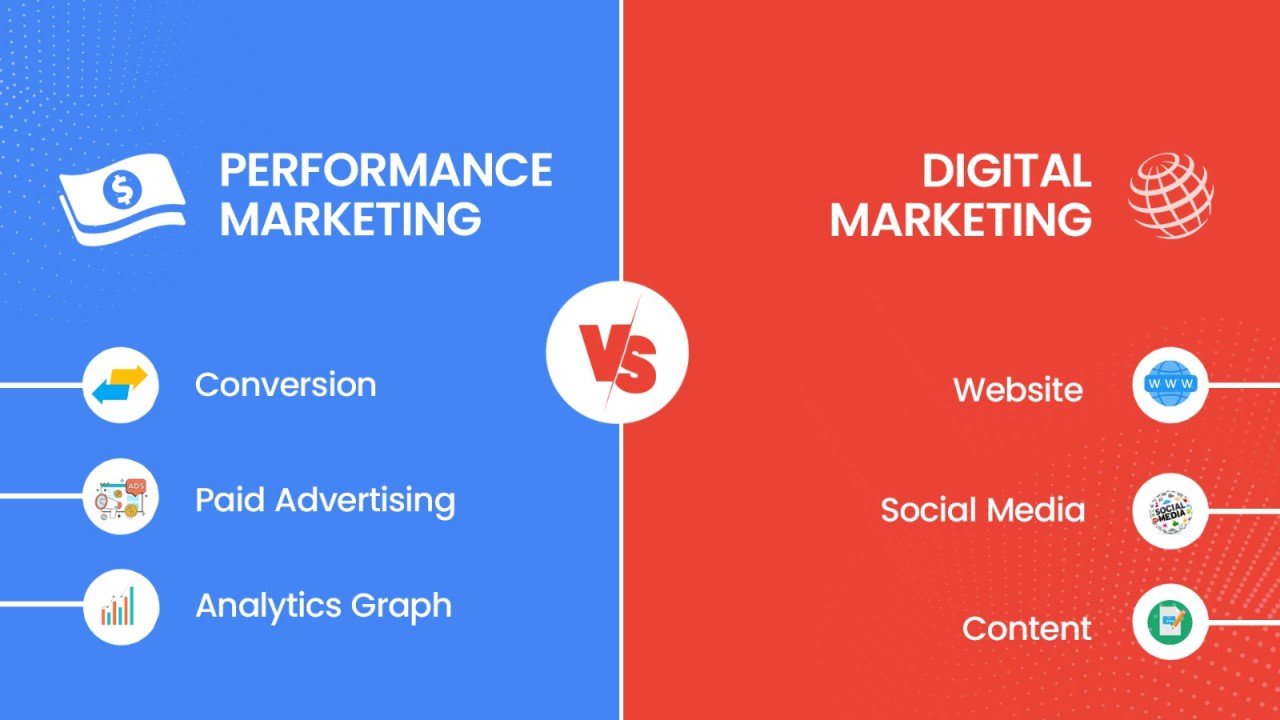
Credit: www.linkedin.com
The Evolution Of Marketing
The way we market products and services has evolved radically over the years. From signs painted on the sides of buildings to ads that populate our social media feeds, marketing has taken a digital turn. This shift has brought about a distinction between digital marketing and performance marketing. Let’s unwrap this evolution to understand its impact.
From Traditional To Digital
Marketing has journeyed from traditional roots to a digital presence. It used to rely on print, television, and radio to reach audiences. This approach spread messages wide, hoping to catch the attention of potential customers. The leap to digital meant businesses could now harness the internet, reaching customers via:
- Websites: The digital storefronts for brands.
- Social media: Where brands engage with customers.
- Email campaigns: For personalized outreach.
The Advent Of Performance-driven Tactics
Digital marketing’s evolution continued with a shift toward performance marketing. This new strategy revolves around data-driven decisions and measurable success. Performance marketing focuses on:
| Tactic | Focus |
|---|---|
| Paid advertising | Ads that cost per click, view, or sale. |
| Affiliate marketing | Partnerships based on commission. |
| Influencer marketing | Promotions with influential individuals. |
Each of these tactics has a clear goal: actual results. Results such as leads, conversions, and sales are tracked meticulously, optimizing campaigns on the fly for better outcomes.
Defining Digital Marketing
Digital marketing is the art of promoting products or services using digital channels. It is a broad term that encompasses all marketing efforts that use an electronic device or the internet.
Channels And Strategies
Key elements of digital marketing include:
- Social Media: Platforms like Facebook and Instagram.
- SEO: Optimizing content to rank higher on search engines.
- Email Marketing: Sending emails to engage customers.
- Content Marketing: Creating valuable content to attract an audience.
- Pay-Per-Click (PPC): Ads you pay for when clicked.
Role In Today’s Business Ecosystem
In the business world, digital marketing is crucial. It:
- Builds Brand Presence: Increases online visibility.
- Engages Customers: Connects with people globally.
- Drives Sales: Converts leads into customers.
- Gathers Insights: Uses data for better strategies.
Defining Performance Marketing
Welcome to the intricate world of marketing, where every click, view, and sale can be tracked and leveraged for growth. In the ocean of digital marketing strategies, one term often stands out: performance marketing. Let’s delve into what truly defines this approach.
Data-driven Approach
Performance marketing thrives on data. This digital strategy meticulously analyzes every piece of information. Marketers learn about audience behaviors and preferences. They use tools to track user interactions, from ads clicked to pages visited. This allows for real-time campaign adjustments and smarter budget allocation. Key metrics guide all decisions. Such metrics include cost-per-click (CPC) and return on investment (ROI).
Focus On Measurable Results
Results take center stage in performance marketing. Every campaign gets measured for effectiveness. The aim is tangible outcomes such as leads, conversions, or sales. Success in performance marketing is not just seen; it’s quantified. Marketers set clear goals and pursue them vigorously. They link spending directly to outcomes. This ensures accountability and transparency in marketing efforts. It maximizes results while minimizing wasted expenditure.
Core Objectives Compared
Understanding the core objectives of digital and performance marketing clarifies their roles in business strategy. Below, explore how their goals differ.
Brand Awareness Versus Direct Response
Digital marketing excels in creating brand awareness. It paints a broad stroke across the digital canvas. It tells your story to the world. Performance marketing, in contrast, zeroes in on direct response. It seeks an immediate reaction, often a click, sign-up, or sale.
- Digital Marketing: Builds visibility and reputation over time.
- Performance Marketing: Drives actions and conversions quickly.
Long-term Growth Versus Immediate Roi
Long-term growth remains the stronghold of digital marketing. It plants seeds for future success with content and relationships. On the flip side, immediate ROI shapes performance marketing. It demands quick results from every campaign. It tracks every dollar spent, ensuring money works today.
| Digital Marketing | Performance Marketing |
|---|---|
| Nurtures future prospects | Targets quick wins |
| Considers overall brand health | Focuses on measurable results |
Tools Of The Trade
Tools of the Trade are essential in differentiating the effectiveness of Digital Marketing and Performance Marketing. Each employs specific tools that align with their strategies. To maximize impact, understanding the software and analytical resources inherent to each is crucial.
Software And Platforms For Digital Marketing
Digital marketing thrives on diverse software and platforms. These tools extend reach and craft engaging experiences.
- Email Marketing: Automates contact and personalize messaging.
- Social Media Management: Schedules content and tracks engagement.
- Content Management Systems: Streamlines website content creation.
- SEO Tools: Monitors rankings and optimizes web presence.
- Advertising Platforms: Manages and optimizes online ads.
Analytics And Attribution In Performance Marketing
Performance Marketing hinges on data. Accurate analytics and attribution offer insights into campaign effectiveness.
| Tool Type | Function |
|---|---|
| Web Analytics: | Tracks user behavior and conversion paths. |
| Attribution Solutions: | Identifies touchpoints critical to conversion. |
| Conversion Tracking: | Monitors specific actions completed by users. |
| A/B Testing Platforms: | Compares variants to improve performance. |
Performance marketers leverage these tools to refine campaigns and boost ROI.
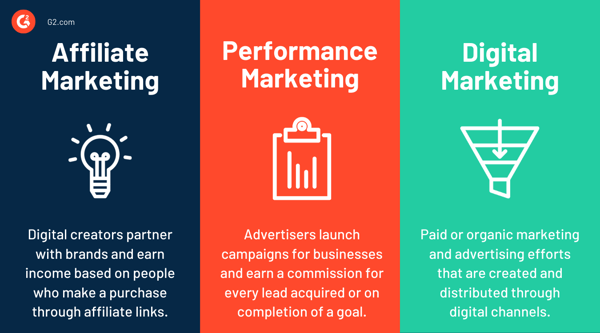
Credit: learn.g2.com
Differences In Channels And Tactics
Understanding the nuances in channels and tactics is crucial when dissecting digital marketing and performance marketing. Each approach utilizes different platforms and strategies to achieve its unique goals. Let’s dive into what sets them apart in terms of channels and tactics.
Diverse Digital Platforms
Engagement across various platforms is key in digital marketing. Brands employ a wide array of digital touchpoints:
- Social media: Reaching audiences via platforms like Facebook, Instagram, and Twitter.
- Email marketing: Communicate directly with customers through newsletters.
- Content marketing: Educating and entertaining through blogs and videos.
- SEO: Enhancing visibility on search engines like Google.
Concentration On High-performing Channels
In contrast, performance marketing prioritizes channels that drive actions.
These channels typically include:
- Pay-per-click (PPC) advertising: Ads on search engines with clear ROI metrics.
- Affiliate marketing: Partnering with others to promote products on a commission basis.
- Native advertising: Ads that blend with content on a website.
- Programmatic advertising: Using software to buy digital ads in real time.
Key to success in performance marketing is tracking, measuring, and analyzing every click and conversion.
Integration And Intersection
Understanding the link between digital and performance marketing is vital. Each has a unique role. But together, they create a powerful strategy. Let’s explore how they integrate and intersect.
How Digital And Performance Marketing Complement Each Other
Digital marketing casts a wide net. It builds a brand’s online presence. Performance marketing hones in on concrete results. It looks at data and adjusts for success. Together, they fill each other’s gaps.
- Brand Awareness: Digital marketing introduces your brand. Performance marketing boosts this through targeted campaigns.
- Data-Driven Approach: Performance marketing data sharpens digital marketing strategies.
- Reach and Conversion: Digital marketing spreads the word. Performance marketing makes sure the word gets results.
Successful Case Studies
Cases show the power of integration. Real brands have seen real success.
| Brand | Digital Marketing Role | Performance Marketing Win |
|---|---|---|
| Brand X | Social media engagement | Hiked sales by 25% |
| Brand Y | SEO for visibility | Lowered acquisition costs by 30% |
| Brand Z | Email marketing campaigns | Increased repeat customers by 40% |
Choosing The Right Strategy For Your Business
When embarking on a digital journey, businesses often grapple with the choice between digital marketing and performance marketing. The key to a successful campaign lies in understanding the nuances of each strategy. This section will guide you through the process of choosing one that aligns with your specific business needs.
Assessing Your Marketing Goals
Evaluating your marketing objectives is the first step to deciding which strategy fits your brand. Do you want to increase brand awareness, drive engagement, or generate leads? Digital marketing offers a broad approach, ideal for building a brand image across various online platforms. On the other hand, performance marketing zeroes in on concrete actions and outcomes, like clicks and conversions. By identifying your end goals, you can select a strategy that best matches your business aspirations.
- Digital marketing: wider reach, brand building.
- Performance marketing: targeted actions, measurable results.
Budget Considerations And Expectations
The size of your budget can heavily influence your strategy choice. Digital marketing can be cost-effective but may require a longer time frame for seeing results. If you’re working with a lean budget, performance marketing might be the way. With its focus on pay-for-performance, it allows for a more controlled expenditure with a clear view on ROI. Set realistic budget limits and expectation timelines to steer your strategy selection.
| Strategy | Budget Usage | Result Measurement |
|---|---|---|
| Digital Marketing | Variable, long-term investment | Qualitative analysis |
| Performance Marketing | Fixed, based on outcomes | Quantitative metrics |
The Future Of Marketing
The landscape of marketing is changing rapidly. Digital Marketing and Performance Marketing both play crucial roles. Yet, they will evolve differently as we step into the future.
Emerging Trends And Predictions
Marketing professionals always glance ahead. Key trends shape the future of marketing:
- Artificial Intelligence revolutionizes customer experiences.
- Data-Driven Strategies become essential for decision-making.
- Personalization reaches new heights with technology advancements.
- Visual and Voice Search alter the SEO landscape.
Predictions include:
- Short-form video content will dominate.
- Micro-moments will decide purchasing decisions.
- Interactive content will engage more consumers.
Continuous Learning And Adaptation
For marketers, staying relevant means learning non-stop. Adaptation strategies become crucial:
- Constantly update SEO techniques for search algorithms.
- Use analytics to measure and refine campaigns.
- Develop skills in new marketing tools and platforms.
- Engage with the latest social media trends.
Marketers must be agile. Keep adapting to user behavior and tech innovations.
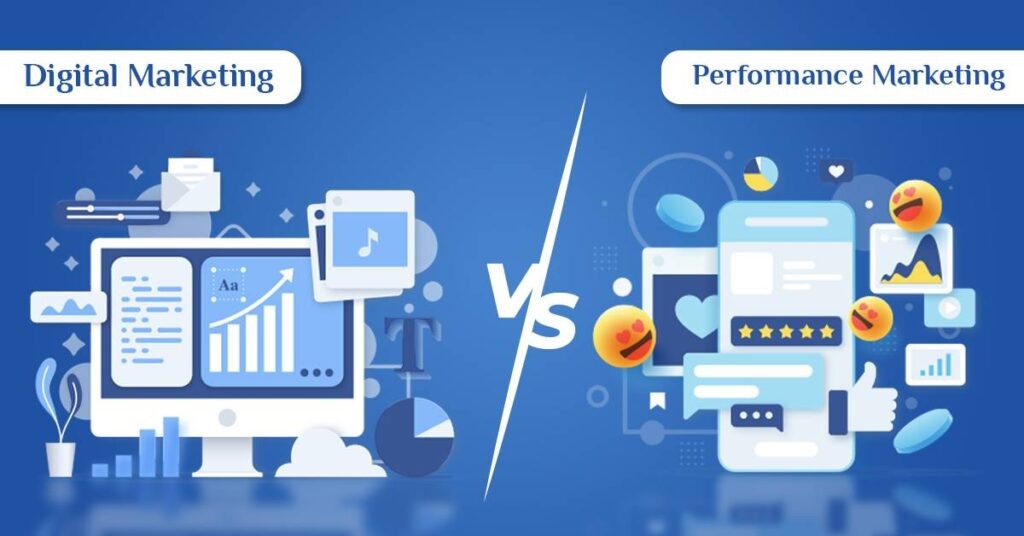
Credit: www.linkedin.com
Frequently Asked Questions For What Is The Difference Between Digital Marketing And Performance Marketing
What Defines Digital Marketing?
Digital marketing encompasses a broad range of online marketing activities. It includes SEO, content marketing, social media, and email campaigns. It aims to reach customers through various digital channels.
How Does Performance Marketing Differ?
Performance marketing is results-driven, focusing on specific objectives such as conversions or sales. It often involves pay-per-click (PPC) campaigns, affiliate marketing, and measurable ROI-driven strategies.
Why Is Seo Important In Digital Marketing?
SEO increases a website’s visibility on search engines like Google. It optimizes content to rank higher for targeted keywords, driving organic traffic, and improving user experience.
Can Performance Marketing Boost Brand Awareness?
Though primarily conversion-oriented, performance marketing can also amplify brand awareness. Using targeted ads, companies reach precise audiences, heightening their brand’s recognition in the market.
Conclusion
Understanding the nuances between digital marketing and performance marketing is crucial for any business strategy. Digital marketing encompasses the broader online presence, while performance marketing dives into the data-driven results. Both play pivotal roles in a successful online strategy, complementing each other to enhance brand visibility and achieve specific objectives.
Embrace these methods to optimize your marketing efforts and drive meaningful outcomes.

